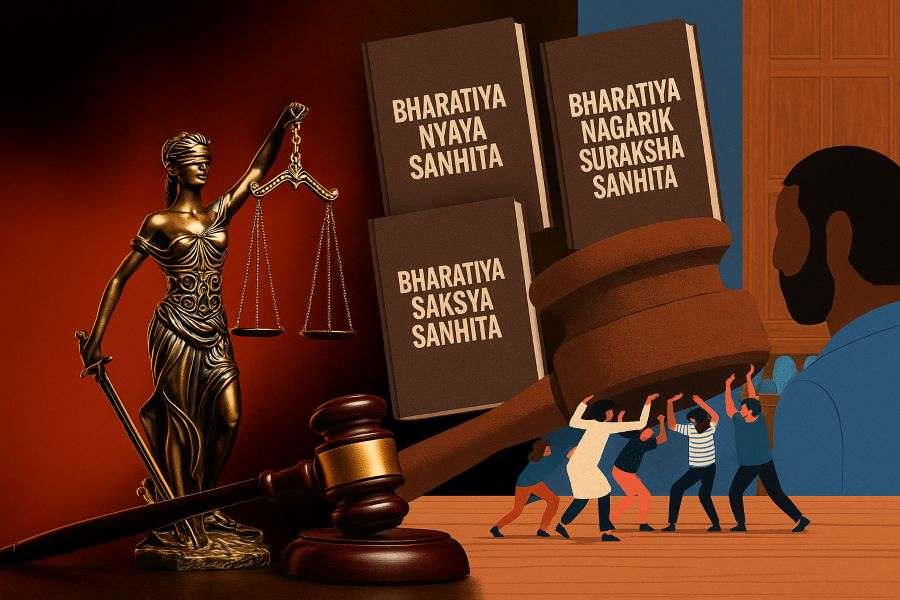The new criminal laws promise efficiency, but retaining colonial-era acts keeps India’s democracy shackled to its past.
THERE ARE REPORTS that the conviction rate under the new criminal laws — namely the Bharatiya Nyaya Sanhita (BNS), Bharatiya Nagarik Suraksha Sanhita (BNSS), and Bharatiya Sakshya Adhiniyam (BSA) — has accelerated, leading to quicker dispensation of justice.
The new laws were enforced in July last year, and reports claim that conviction rates have risen from 18 per cent to 80 per cent in various districts across the country. This improvement is being attributed to strict timelines for charge-framing and judgments, along with the increased use of digital and video evidence.

India’s new criminal codes — BNS, BNSS, and BSA — aim to modernize justice but raise questions about liberty.
Describing the introduction of the new laws as the biggest reform of the 21st century, Union Home Minister Amit Shah recently said that the country’s criminal justice system would soon become the most modern in the world. He added that by 2027, justice would be delivered within three years.
While this is welcome, the world’s largest democracy continues to retain certain British-era criminal laws that were originally enforced by the colonial rulers to muzzle protests during India’s independence movement. Unfortunately, these draconian laws have been allowed to remain in force under the present dispensation.
Laws such as the sedition law, the criminal defamation law, the National Security Act (NSA), and the rechristened Unlawful Activities (Prevention) Act (UAPA) continue to be misused to suppress or discourage criticism of the government. Law enforcers apparently feel that any criticism of the government amounts to criticism of the country itself.

Student activist Umar Khalid’s prolonged detention under UAPA highlights concerns over the misuse of anti-terror laws.
There are numerous examples of such misuse. The continued denial of bail to student activist Umar Khalid for the last five years is a case in point.
Khalid was arrested on September 13, 2020, in connection with the Delhi riots and was subsequently charged under the UAPA for offences including sedition, murder, promoting enmity between religious groups, unlawful assembly, and rioting, among others.
Although the UAPA was originally intended for terrorism-related cases, its ambit has now been stretched to cover even minor offences.
Unlike other laws, where the accused is presumed innocent until proven guilty, under the UAPA, the burden of proving innocence lies on the accused. This law has been misused by successive governments.

Activist Sonam Wangchuk’s arrest under the NSA revived debate over the use of security laws against dissent.
Recently, well-known environmentalist and Ladakh-based activist Sonam Wangchuk was arrested under another such law, the National Security Act (NSA), where again the onus is on the accused to prove that he is not guilty. Bail is generally denied to those arrested under these laws.
Sedition and UAPA provisions have been invoked against retired bureaucrats, judicial officers, and journalists for simply raising demands for justice. A couple of years ago, a 22-year-old girl was charged with sedition for raising slogans against the government, while an octogenarian was imprisoned for alleged anti-national activities.
Official data from the National Crime Records Bureau (NCRB) confirm that there has been a sharp increase in the number of people booked under these laws.
 Another law that deserves to be scrapped is the criminal defamation law — a relic of colonialism that has no place in a modern democracy. It is heartening that the Supreme Court has recently observed that defamation should be decriminalised. The outdated law was enacted in 1860 to suppress public debate against the British government.
Another law that deserves to be scrapped is the criminal defamation law — a relic of colonialism that has no place in a modern democracy. It is heartening that the Supreme Court has recently observed that defamation should be decriminalised. The outdated law was enacted in 1860 to suppress public debate against the British government.
Several other countries, including the United Kingdom itself, have scrapped their criminal defamation laws, but India continues with this archaic provision, even though some other reforms have been introduced under the BNS.
Experts point out that there are sufficient remedies available in civil law to deal with defamation, and criminalising speech is not justified.
We continue to use criminal defamation provisions against political opponents, journalists, and activists. Such cases drag on for years, often ending in acquittal. However, in most cases, the long and tedious process itself becomes the punishment. ![]()
Republished by AIDEM under a content-sharing arrangement with Punjab Today.
________
Also Read:
DIG Bhullar Case: Silence That Speaks Volumes
The Quiet Collapse of Tolerance
Disclaimer : PunjabTodayNews.com and other platforms of the Punjab Today group strive to include views and opinions from across the entire spectrum, but by no means do we agree with everything we publish. Our efforts and editorial choices consistently underscore our authors’ right to the freedom of speech. However, it should be clear to all readers that individual authors are responsible for the information, ideas or opinions in their articles, and very often, these do not reflect the views of PunjabTodayNews.com or other platforms of the group. Punjab Today does not assume any responsibility or liability for the views of authors whose work appears here.
Punjab Today believes in serious, engaging, narrative journalism at a time when mainstream media houses seem to have given up on long-form writing and news television has blurred or altogether erased the lines between news and slapstick entertainment. We at Punjab Today believe that readers such as yourself appreciate cerebral journalism, and would like you to hold us against the best international industry standards. Brickbats are welcome even more than bouquets, though an occasional pat on the back is always encouraging. Good journalism can be a lifeline in these uncertain times worldwide. You can support us in myriad ways. To begin with, by spreading word about us and forwarding this reportage. Stay engaged.
— Team PT

